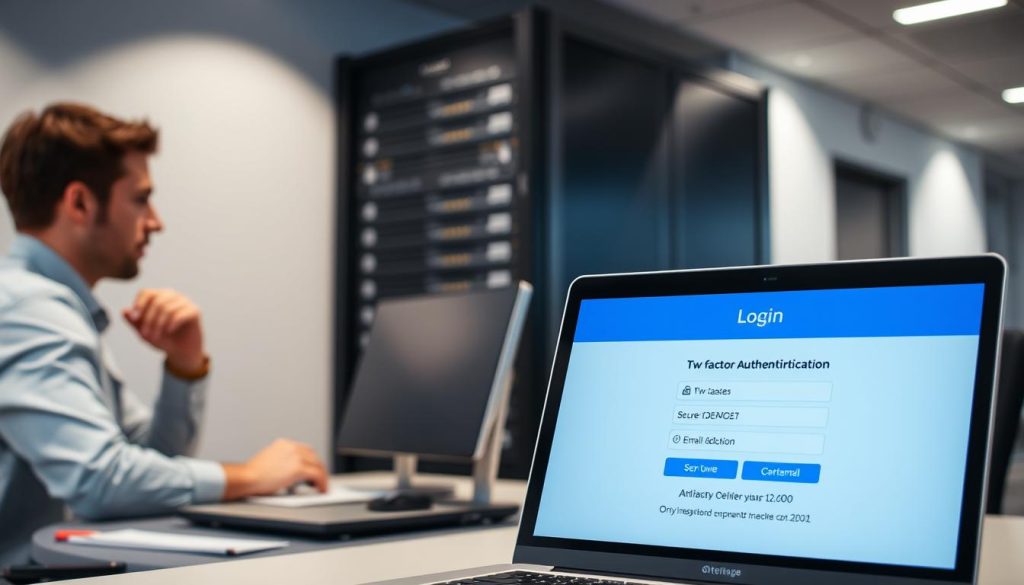In today’s digital landscape, email security is paramount. With the average person spending over 2 hours a day checking work and personal email, it’s clear that email has become a critical component of business communication.
However, this increased reliance on email also makes it a prime target for cyberattacks. Our enterprise-grade email server is designed to provide robust security for login emails, protecting businesses from various threats and ensuring the confidentiality, integrity, and availability of their email communications.

At our company, we empower businesses with comprehensive cybersecurity solutions through expertise and proactive protection. With our solution, companies can trust that their email communications are safeguarded against potential breaches.
Key Takeaways
- Robust security for login emails with our enterprise-grade email server
- Protection against various cyber threats
- Ensured confidentiality, integrity, and availability of email communications
- Comprehensive cybersecurity solutions for businesses
- Proactive protection and expertise
The Critical Role of Login Emails in Enterprise Security
As cyber threats escalate, the importance of securing login emails cannot be overstated. Login emails are a crucial component of enterprise security, often serving as the primary means of authentication and verification. Cyber attackers target login emails to gain unauthorized access to sensitive information and systems.
Why Login Emails Are Prime Targets for Cyberattacks
Login emails are attractive targets for cybercriminals due to their potential to grant access to a wealth of sensitive information. Cyberattacks on login emails can lead to significant security breaches. We must understand the vulnerabilities associated with login emails to implement effective security measures.
Statistics on Authentication Email Breaches
Recent statistics highlight the alarming rate of authentication email breaches. For instance, a significant percentage of businesses experience email-based attacks annually.
| Year | Percentage of Businesses Affected | Type of Attack |
|---|---|---|
| 2022 | 45% | Phishing |
| 2023 | 52% | Malware |
Evolution of Email-Based Attack Vectors
Email-based attack vectors have evolved significantly over the years. Attackers now use sophisticated techniques, including AI-powered phishing and social engineering tactics, to bypass traditional security measures.
The Business Impact of Compromised Authentication Emails
The consequences of compromised authentication emails can be severe, affecting both the financial and reputational standing of a business. Understanding these impacts is crucial for implementing robust security measures.
Financial Consequences of Email Security Breaches
Email security breaches can lead to significant financial losses. The costs associated with remediation, legal fees, and potential fines can be substantial.
Reputational Damage and Customer Trust
Beyond financial losses, email security breaches can also result in reputational damage and erosion of customer trust. Maintaining robust email security is essential for preserving business reputation.
Understanding the Vulnerabilities in Standard Email Systems
Understanding the weaknesses in standard email infrastructure is crucial for enterprise security. Standard email systems, such as those provided by Gmail or Outlook, often lack robust security measures by default, making them vulnerable to various threats.
Common Security Gaps in Email Infrastructure
Email infrastructure security gaps can be broadly categorized into two main areas: unencrypted transmission and weak authentication mechanisms.
Unencrypted Transmission Risks
When emails are transmitted without encryption, they can be intercepted and read by unauthorized parties. This unencrypted transmission risk is a significant vulnerability, as it allows attackers to access sensitive information.
Weak Authentication Mechanisms
Weak authentication mechanisms make it easy for attackers to gain unauthorized access to email accounts. Simple passwords and lack of multi-factor authentication can be exploited by attackers using various techniques.
How Attackers Exploit Email Authentication Weaknesses
Attackers exploit email authentication weaknesses using sophisticated techniques, including man-in-the-middle attacks and credential harvesting methods.
Man-in-the-Middle Attack Techniques
Man-in-the-middle (MitM) attacks involve intercepting communication between two parties to steal sensitive information. Attackers can use MitM techniques to capture login credentials and other sensitive data.
Credential Harvesting Methods
Credential harvesting involves collecting login credentials through phishing attacks, malware, or other means. Attackers use these credentials to gain unauthorized access to email accounts and other systems.
Login Email Secure Server: The Foundation of Enterprise Email Protection
Our secure email server is engineered with advanced security features to safeguard login emails. This robust foundation is crucial for protecting enterprise email communications.
Core Components of Our Secure Email Server Architecture
Our secure email server architecture is built with two primary components: military-grade security infrastructure and redundant security layers.
- Military-Grade Security Infrastructure: We utilize top-tier security measures to protect against sophisticated threats.
- Redundant Security Layers: Multiple layers of security ensure that if one layer is breached, others will still protect the email.
| Security Feature | Description | Benefit |
|---|---|---|
| Military-Grade Infrastructure | Top-tier security measures | Enhanced protection against sophisticated threats |
| Redundant Security Layers | Multiple layers of security | Continued protection even if one layer is breached |
Advanced Encryption Technologies Implemented
We implement cutting-edge encryption technologies to ensure the security of login emails.
- TLS 1.3 and Beyond: Utilizing the latest transport layer security protocol for enhanced encryption.
- Quantum-Resistant Encryption Options: Preparing for future quantum computing threats with advanced encryption methods.
By combining military-grade security infrastructure, redundant security layers, and advanced encryption technologies, our login email secure server provides comprehensive protection for enterprise email communications.
Multi-layered Security Approach for Login Email Protection
Login email security is bolstered by our multi-layered approach, combining various protective measures to ensure comprehensive protection against diverse threats.
Email Authentication Protocols (SPF, DKIM, DMARC)
Implementing email authentication protocols such as SPF, DKIM, and DMARC is crucial for preventing email spoofing and phishing attacks. These protocols work together to verify the authenticity of emails, ensuring that only legitimate emails are delivered to the user’s inbox.
Implementation Best Practices
To effectively implement these protocols, it’s essential to configure them correctly. This includes setting up SPF records to define authorized sending IP addresses, DKIM to validate the integrity of email content, and DMARC to specify policies for handling unauthenticated emails.
Monitoring Authentication Results
Continuous monitoring of authentication results is vital to identify potential issues or malicious activities. This involves regularly reviewing SPF, DKIM, and DMARC reports to detect and respond to authentication failures.
Transport Layer Security and End-to-End Encryption
Transport Layer Security (TLS) and end-to-end encryption are critical components of our multi-layered security approach. TLS encrypts emails in transit, while end-to-end encryption ensures that emails remain encrypted throughout their journey, protecting them from interception.
Certificate Management and Validation
Effective certificate management is necessary to ensure the validity and trustworthiness of TLS certificates. Regular validation of these certificates prevents the use of expired or fraudulent certificates.
Secure Key Exchange Mechanisms
Secure key exchange mechanisms are used to establish and manage encryption keys. This ensures that only authorized parties can access the encrypted emails.
Advanced Threat Detection Systems
Our advanced threat detection systems utilize behavioral analysis algorithms and zero-day threat protection to identify and mitigate sophisticated attacks. These systems are designed to detect anomalies in email behavior, indicating potential threats.
Behavioral Analysis Algorithms
Behavioral analysis algorithms monitor email patterns to identify deviations that may indicate malicious activity. This proactive approach helps in detecting and responding to threats before they cause harm.
Zero-Day Threat Protection
Zero-day threat protection is crucial for defending against newly discovered vulnerabilities. Our systems are designed to detect and respond to these threats in real-time, minimizing the risk of attack.
| Security Measure | Description | Benefits |
|---|---|---|
| Email Authentication Protocols | SPF, DKIM, DMARC implementation | Prevents email spoofing and phishing |
| Transport Layer Security | TLS encryption | Protects emails in transit |
| End-to-End Encryption | Encryption from sender to recipient | Ensures email confidentiality |
| Advanced Threat Detection | Behavioral analysis and zero-day protection | Detects and mitigates sophisticated threats |
Preventing Phishing Attacks on Authentication Emails
Phishing attacks on authentication emails pose a significant threat to enterprise security, necessitating robust preventive measures. We employ a multi-faceted approach to protect against these threats, ensuring the integrity of our email security system.
AI-Powered Phishing Detection
Our AI-powered phishing detection utilizes advanced machine learning models to identify and mitigate phishing threats. This technology enables us to stay ahead of emerging phishing tactics.
Machine Learning Models for Threat Identification
We use sophisticated machine learning algorithms to analyze patterns and detect anomalies in email traffic, effectively identifying potential phishing attempts.
Continuous Learning and Adaptation
Our system continuously learns from new data, adapting to evolving phishing techniques to ensure ongoing protection against emerging threats.
User Education and Security Awareness
In addition to technological safeguards, we emphasize the importance of user education in preventing phishing attacks. Our comprehensive training programs empower employees to recognize and respond to phishing attempts effectively.
Training Programs for Email Security
We offer specialized training programs designed to educate users about email security best practices and how to identify phishing emails.
Simulated Phishing Campaigns
To reinforce our training, we conduct simulated phishing campaigns that test users’ awareness and preparedness, helping to identify areas for improvement.
| Security Measure | Description | Benefit |
|---|---|---|
| AI-Powered Phishing Detection | Utilizes machine learning to identify phishing threats | Enhanced threat detection and mitigation |
| User Education and Training | Educates users on email security and phishing identification | Increased user awareness and response to phishing attempts |
| Simulated Phishing Campaigns | Tests user awareness through simulated attacks | Improved user preparedness and security posture |
Implementing Two-Factor Authentication with Secure Email Delivery
Two-factor authentication (2FA) paired with secure email delivery represents a robust security measure for protecting enterprise login emails. By adding an extra layer of verification, 2FA significantly reduces the risk of unauthorized access to sensitive information.
Secure Delivery of 2FA Codes via Enterprise Email
Our solution ensures that 2FA codes are delivered securely via enterprise email, utilizing advanced security protocols to prevent interception or tampering.
Time-Sensitive Code Generation
We generate time-sensitive 2FA codes that expire after a limited period, reducing the window of opportunity for attackers.
Secure Transmission Protocols
Our email server employs robust encryption protocols to safeguard 2FA codes during transmission, ensuring they remain confidential.
Alternative Authentication Channels as Backup
In addition to secure email delivery, we support alternative authentication channels to provide flexibility and redundancy in the authentication process.
SMS and Mobile App Integration
Our system integrates with SMS and mobile apps, offering users a convenient backup authentication method.
Hardware Token Compatibility
We also support hardware token compatibility, providing an additional layer of security for high-risk transactions or access to sensitive data.

Compliance and Regulatory Benefits of Secure Login Email Servers
Our secure login email servers are designed to help organizations meet stringent data protection regulations. By implementing our enterprise-grade email security solutions, businesses can ensure compliance with various regulatory requirements, thereby avoiding potential legal and financial repercussions.
Meeting GDPR Requirements for Data Protection
The General Data Protection Regulation (GDPR) mandates stringent data protection measures for organizations operating within the European Union. Our secure email servers facilitate GDPR compliance through:
- Data Processing Documentation: We provide comprehensive documentation of data processing activities, ensuring transparency and accountability.
- Right to Be Forgotten Implementation: Our system allows for the efficient erasure of personal data upon request, adhering to the “right to be forgotten” principle.
HIPAA Compliance for Healthcare Organizations
For healthcare organizations, compliance with the Health Insurance Portability and Accountability Act (HIPAA) is critical. Our secure login email servers support HIPAA compliance by:
- PHI Protection in Email Communications: We ensure that Protected Health Information (PHI) is safeguarded during email transmissions.
- Audit Trail and Reporting Features: Our system provides detailed audit trails and reporting capabilities, enabling healthcare organizations to monitor and demonstrate compliance.
Financial Industry Regulations (SOX, PCI DSS)
Financial institutions must comply with regulations such as the Sarbanes-Oxley Act (SOX) and the Payment Card Industry Data Security Standard (PCI DSS). Our secure email servers aid in compliance by:
- Transaction Verification Requirements: We facilitate the verification of financial transactions via secure email communications.
- Data Retention Policies: Our system supports the implementation of data retention policies that align with financial industry regulations.
ROI and Cost-Effectiveness of Enterprise Email Security
The cost-effectiveness of enterprise email security solutions is becoming increasingly important in today’s threat landscape. As businesses continue to face sophisticated cyberattacks, investing in robust email security measures is crucial for protecting sensitive information and maintaining operational integrity.
Calculating the True Cost of Email Security Breaches
Email security breaches can have far-reaching financial implications for enterprises. Understanding these costs is essential for justifying investments in email security.
Direct Financial Losses
Direct financial losses due to email security breaches include costs associated with incident response, data recovery, and potential regulatory fines. For instance, the average cost of a data breach is significantly higher when email accounts are compromised.
Indirect Costs and Operational Impact
Indirect costs, such as reputational damage and loss of customer trust, can be equally devastating. These intangible losses can impact long-term business viability and revenue generation.
Long-term Benefits of Proactive Security Investment
Proactive investment in email security can yield significant long-term benefits, enhancing an organization’s overall security posture.
Reduced Incident Response Costs
By implementing robust email security measures, businesses can reduce the likelihood and impact of security incidents, thereby lowering incident response costs.
Insurance Premium Reductions
Organizations with strong security controls, including comprehensive email security, may be eligible for reductions in cyber insurance premiums, further enhancing the ROI of their security investments.
Seamless Integration with Existing Enterprise Infrastructure
Seamless integration is at the heart of our secure email server solution. We understand that enterprises have complex IT ecosystems, and our email security solution is designed to fit into this landscape without disruption.
Compatible Authentication Systems and Directories
Our secure email server supports a range of authentication systems and directories to ensure compatibility with your existing infrastructure. This includes:
- Active Directory and LDAP Integration: We integrate with your existing user directories to simplify user management and authentication.
- Single Sign-On (SSO) Compatibility: Enhance user experience and security with SSO, allowing users to access multiple applications with a single set of login credentials.
Active Directory and LDAP Integration
Our solution integrates with Active Directory and LDAP, enabling you to manage user access and authentication policies from a single console.
Single Sign-On Compatibility
By supporting SSO, we reduce the complexity of managing multiple usernames and passwords, improving both security and user experience.
API-Based Integration Capabilities
For more customized integration needs, our secure email server offers robust API-based capabilities.
- RESTful API Documentation: Our comprehensive API documentation guides you through the integration process, making it easier to customize and extend our email security solution.
- Custom Integration Support: Our team is available to provide support for custom integrations, ensuring that our solution meets your specific needs.
RESTful API Documentation
Our RESTful API is designed to be intuitive and easy to use, with detailed documentation that covers all available endpoints and methods.
Custom Integration Support
We recognize that every enterprise is unique, and our team is committed to providing the support you need to integrate our email security solution with your existing systems.
| Integration Feature | Description | Benefit |
|---|---|---|
| Active Directory/LDAP Integration | Integration with existing user directories | Simplified user management |
| Single Sign-On (SSO) | Access multiple applications with one login | Enhanced user experience and security |
| RESTful API | Customizable API for integration | Flexibility and customization |
Real-time Monitoring and Threat Intelligence for Email Security
Real-time monitoring and advanced threat intelligence are at the core of our email security infrastructure. We understand that the landscape of cyber threats is constantly evolving, and our system is designed to stay ahead of these threats.
24/7 Security Operations Center Support
Our 24/7 security operations center provides expert support, ensuring that any potential security threats are addressed immediately. This around-the-clock vigilance is crucial in preventing email-based attacks.
Expert Security Analyst Team
Our team of expert security analysts is trained to identify and mitigate complex threats. Their expertise is invaluable in maintaining the security of our email infrastructure.
Incident Response Protocols
We have established incident response protocols to quickly respond to security incidents. These protocols are designed to minimize the impact of a breach and ensure business continuity.
Proactive Threat Hunting and Response
In addition to reactive measures, we employ proactive threat hunting to identify potential vulnerabilities before they can be exploited. This proactive approach is supported by our advanced email threat protection capabilities.
Global Threat Intelligence Network
Our global threat intelligence network provides us with real-time data on emerging threats, enabling us to update our defenses accordingly.
Automated Remediation Capabilities
We utilize automated remediation capabilities to swiftly address identified threats, reducing the risk of a security breach.
Case Studies: Enterprises That Enhanced Security with Our Login Email Server
The effectiveness of our login email server is best demonstrated through the success stories of our clients. Various enterprises have enhanced their security with our solution, achieving significant threat reduction and compliance.
Financial Services Company Security Transformation
A leading financial services company faced sophisticated phishing campaigns that threatened their email security. Our login email server was implemented to bolster their defenses.
Challenge: Sophisticated Phishing Campaigns
The company was targeted by highly convincing phishing attacks, putting their sensitive data at risk.
Solution and Results: 99.8% Threat Reduction
By utilizing our advanced email security features, they achieved a 99.8% reduction in threats, significantly enhancing their security posture.
Healthcare Provider's Compliance Achievement
A healthcare provider sought to address HIPAA compliance gaps in their email infrastructure. Our login email server provided the necessary security measures.
Challenge: HIPAA Compliance Gaps
The provider faced challenges in meeting stringent HIPAA requirements for email security and data protection.
Solution and Results: Full Compliance Attainment
With our solution, they attained full HIPAA compliance, ensuring the confidentiality and integrity of patient data.
Technology Firm's Defense Against Advanced Threats
A technology firm was vulnerable to targeted spear phishing attacks. Our login email server helped them defend against these advanced threats.
Challenge: Targeted Spear Phishing Attacks
The firm was at risk from highly sophisticated spear phishing attacks tailored to deceive their employees.
Solution and Results: Zero Successful Breaches
By implementing our email security solution, they achieved zero successful breaches, safeguarding their critical assets.
Conclusion: Securing Your Enterprise's Digital Front Door
Securing login emails is crucial for protecting an enterprise’s digital front door against cyber threats. Our enterprise-grade email server provides comprehensive security features and robust protection against various cyber threats. By implementing our solution, businesses can ensure the security and integrity of their email communications, safeguard sensitive information, and maintain the trust of their customers and stakeholders.
The average cost of a data breach is $4.35 million per incident, highlighting the importance of securing enterprise email infrastructure. Proper web server protection can reduce security issues by 85%, while organizations with secure server infrastructure experience 90% fewer successful security breaches. By following email security best practices, such as implementing AI-enhanced detection and regular updates, businesses can protect their digital front door and prevent costly breaches.
By protecting your login emails and following email security best practices, you are effectively safeguarding your enterprise’s digital front door. This proactive approach to email security is essential for maintaining the trust and confidence of your customers and stakeholders.
FAQ
What makes login emails a prime target for cyberattacks?
Login emails are often used as the primary means of authentication and verification, making them a critical vulnerability in enterprise security. Cyber attackers target login emails to gain unauthorized access to sensitive information and systems.
How does your secure email server protect against phishing attacks?
Our solution incorporates AI-powered phishing detection that utilizes machine learning models to identify and mitigate threats. We also emphasize user education and security awareness through training programs and simulated phishing campaigns.
What encryption technologies do you use to secure email communications?
We implement advanced encryption technologies such as TLS1.3 and offer quantum-resistant encryption options to future-proof against emerging threats.
How does your secure email server ensure compliance with regulatory requirements?
Our solution is designed to help organizations meet various regulatory requirements, including GDPR, HIPAA, SOX, and PCI DSS, through features such as data processing documentation, audit trail and reporting, and transaction verification.
Can your secure email server integrate with our existing enterprise infrastructure?
Yes, our solution is designed to integrate seamlessly with existing enterprise infrastructure, supporting compatible authentication systems and directories, including Active Directory and LDAP, as well as single sign-on (SSO) compatibility.
What kind of support do you offer for email security?
Our 24/7 security operations center provides around-the-clock support and incident response protocols to address email security threats, backed by a team of expert security analysts.
How does two-factor authentication (2FA) enhance email security?
Implementing 2FA with secure email delivery enhances the security of login emails by generating time-sensitive 2FA codes and delivering them securely via enterprise email, providing an additional layer of protection against unauthorized access.
What are the benefits of investing in enterprise email security?
Investing in enterprise email security can provide significant returns on investment (ROI) by preventing costly security breaches, reducing incident response costs, and potentially lowering insurance premiums.
How do you stay ahead of emerging email security threats?
Our solution leverages a global threat intelligence network, automated remediation capabilities, and proactive threat hunting and response to stay ahead of emerging threats.
Can you provide examples of successful email security implementations?
Yes, our case studies include a financial services company that achieved a 99.8% threat reduction against sophisticated phishing campaigns, a healthcare provider that attained full HIPAA compliance, and a technology firm that successfully defended against targeted spear phishing attacks with zero successful breaches.






